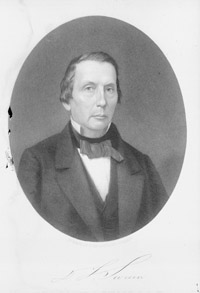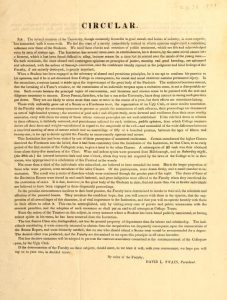
“David Lowry Swain.” Photograph no. 53.15.655. From the Audio Visual and Iconographics Collection, Division of Archives and History Photograph Collection, North Carolina State Archives, Raleigh, NC, USA.
Kameron Southerland
In the years before the Civil War, students at the University of North Carolina were a rebellious bunch. Beginning in 1838, students organized themselves into “combinations” to perpetrate mischief, calling themselves members of the Ugly Club and the Boring (or “Irritating”) Club. Faculty initially tried to quell this mischief by having students sign pledges not to join such clubs, but this was not effective. For a period of three weeks in the early fall of 1840, student rebellions became especially persistent. Escapades included dousing faculty members with water when they attempted to enter academic halls, throwing bricks and furniture out of dorm windows, stealing horses and riding them through campus, painting professors’ horses to look like zebras, and the occasional “treat” in the woods – an after-hours drinking party usually leading to more debauchery and destruction. [1] It is in the wake of one of these treats put on by the Ugly club that President Swain writes to parents concerning the disciplinary measures to be taken concerning their sons.
“Certain members of the higher Classes deceived the Freshmen into the belief, that it had been customary from the foundation of the Institution, for that Class, at an early period of the first session of the Collegiate year, to give a treat to the other Classes. A subscription of $2 each was thus obtained from about thirty-five members of the Class. Wine and ardent spirits were procured from Hillsborough, and on Saturday night, (the 29th ult.) the interval between dark and nine o’clock, when they were not required by the laws of the College to be in their rooms was appropriated to a celebration of this Festival in the woods.” [2]

President Swain to parents on inappropriate student behavior, 1840. Digitized in the North Carolina Experience Collection, Documenting the American South, University of North Carolina at Chapel Hill.
David Lowry Swain was not an academic (he did not even receive a college education) but rather a politician whose election as University president was first met with conflict. Although sympathetic to the Whig party, Swain remained anxious as president to keep the university pure from the political controversies of the day and with full support from the board of trustees, Swain insisted that students and faculty alike refrain from public endorsement of controversial political and religious views. [3] Students in this time, however, were very well-read and opinionated as a result of their mostly oratory and aural educations. This circular suggests that when a student engages with these principles at the expense of his studies, “he is too apt to conform his practice to his opinions, and if he is not dismissed from College in consequence, his moral, and social character sustains permanent injury.” [4]
In the peculiar circumstances incident to their local position, the Faculty have determined to invoke to their aid, the solicitude and affection of the parental bosom. They entertain the confident hope, that you will concur with them in the opinion, that the suppression of all assemblages of this character, is of vital importance to the Institution, and that you will co-operate heartily with them in their efforts to effect it. This can be accomplished, only by visiting every case of private and public intoxication with the severest penalties, and the adoption of such measures as shall put an end to all attempts at College Treats.” [5]
University students in this time of new and pervasive political ideals, and housed in an environment where the debate and reconstruction of those ideals is routine, sought to express their opinions on authority, nationalism, identity, religion, etc. in the practice of drinking parties and disorder. These incidents serve as important predecessors to the disorder of the Civil War and shed light on the roots of the consumption of alcohol and “ardent spirits” as rebellion and resistance in the midst of ideological censorship.
___________________________________________________
[1] Letter from Elisha Mitchell to Charles Manly, September 11, 1840, University of North Carolina Papers (#40005), University Archives, University of North Carolina at Chapel Hill.
[2] Circular, David L. Swain, President, 1840, Call number VCp378 UC, North Carolina Collection, University of North Carolina at Chapel Hill.
[3] Biography of David Lowry Swain. From DICTIONARY OF NORTH CAROLINA BIOGRAPHY edited by William S. Powell. Copyright (c) 1979-1996 by the University of North Carolina Press.
[4] Ibid. 2
[5] Ibid. 2